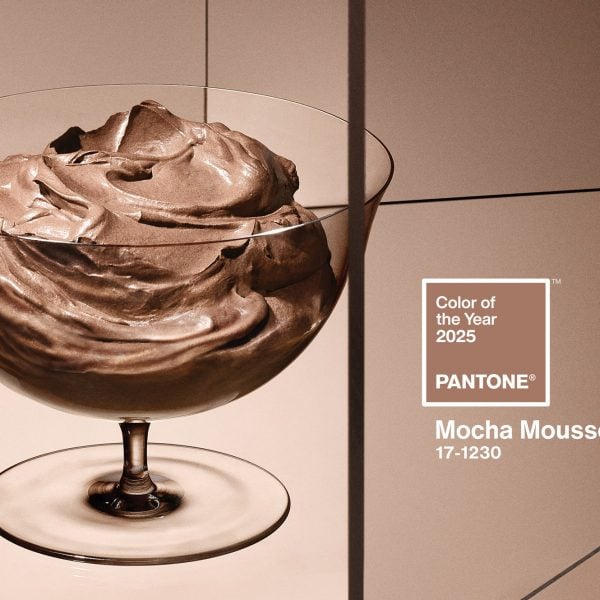Pantone inadvertently got it spot on by choosing the mid-brown Mocha Mousse as its 2025 colour of the year, writes Michelle Ogundehin.
Pantone has released its prediction for colour of the year 2025, and it’s an unremarkable mid-brown called Mocha Mousse.
However, the announcement is worthy of further interrogation as this pick is purported to be a siren of the times. According to the Pantone Color Institute, it expresses “a global mood and an attitude, reflecting collective desire in the form of a single, distinct hue”.
I’d have no issue with any of this if Pantone could be more honest about its annual stunt
Indeed, if the colour company was able to accurately predict the zeitgeist for the forthcoming year, this would be deeply interesting, regardless of any subjective feelings we may harbour about the shade itself.
Yet before any chance for considered discussion, my inbox is already filled by over-eager PRs collating products that vaguely resemble the chosen hue to capitalise on their freshly stated trend-setting status.
Brand collaborations are lined up well in advance too. This year, the newly titled lastminute.com London Eye coloured itself brown for the launch, and Motorola gives us a shiny chocolate-coloured phone.
There’s a scent (blending cocoa bean, salted peanut and vanilla) and a vegan leather makeup bag up for grabs, alongside numerous other brownish things from companies I’ve never heard of. The ink will no doubt still be wet on contracts for 2026, regardless of the next colour to come.
And I’d have no issue with any of this if Pantone could be more honest about its annual stunt. Imagine: here’s what we’ve picked, because we like it, and it’s different to last year, enjoy!
Every company has a marketing playbook. We can’t hold that against them. But cloak the fanfare in soothsaying earnestness, such as Pantone Color Institute’s executive director Leatrice Eiseman describing Mocha Mousse as “answering our desire for comfort” and asserting that it “highlights the relationship between colour and culture”, and we are compelled to comment.
By picking a basic waste-evocative brown, I’d say that Pantone inadvertently got the colour for 2025 spot on
Thus, here are three threads that seem pertinent:
One: the Canadian-British blogger, journalist, and author Cory Doctorow recently coined the word “enshittification” to epitomise the mood of the moment. Macquarie Dictionary defines it as “the gradual deterioration of a service or product brought about by a reduction in the quality of that service (especially of an online platform) as a consequence of profit-seeking”.
Two: according to the new Netflix documentary Buy Now! The Shopping Conspiracy, 13 million phones are thrown out every day; 400 million tonnes of plastic waste is created every year, and 190,000 garments produced every minute. Shein, the Chinese fast-fashion megabrand, is alleged to introduce 1.3 million new styles every single year. This is waste at epic proportions.
Three: in popular psychology, comfort is the enemy of growth because it lulls you into a state of complacency and makes you believe that everything is under control. Embracing what is uncomfortable on the other hand, is a prerequisite for growth and learning.
By picking a basic waste-evocative brown, then, I’d say that Pantone inadvertently got the colour for 2025 spot on. But as per last year, the surrounding narrative is extraordinarily divorced from reality.
For starters, reading from the official press release, Mocha Mousse allegedly captures a “Global Mood of Connection, Comfort, and Harmony”. I wonder to which globe it is referring, as things look anything but harmonious to me right now.
In fact, they look quite shitty, from ongoing wars that (still) show no sign of resolution and incoming presidents who (still) demonstrate little personal integrity, to the seemingly persistent corporate ambivalence (or wilful ignorance) about the causes of climate change and the perils of plastic waste.
Mocha Mousse is a mass-produced, ultra-processed, chocolate-dessert-in-a-plastic-packet sort of brown
The most recent example, with great irony, occurred shortly before the Global Plastics Summit when Coca-Cola, widely cited as one of the most polluting companies on the planet, appeared to quietly drop its pledge to make 25 per cent of its packaging reusable by 2030.
For Mocha Mousse is not a richly pigmented, dependable dark brown or even an earthy, loamy soil kind of brown that we could argue suggests that we become less wasteful and more grounded.
No, Mocha Mousse is a mass-produced, ultra-processed, chocolate-dessert-in-a-plastic-packet sort of brown. An apt motif for planned obsolescence, for let us not ignore that any business model that revolves around replacement is ultimately profiting from our waste.
Mocha Mousse therefore reflects the triumph of manipulative marketing for greed over need. I believe this may be a classic exemplar of enshittification, in both story and hue.
As I wrote in my trend report at the very beginning of this year, this is no time to be distracted by talk of trends, new or latest looks. The tactic of holding facts at arm’s length has only enabled denial, obfuscation and fakery, as well as cauterising our moral obligation to change.
Bottom line: right now we need the truth to have a chance to choose growth over a sugar-soaked somniferous pudding, AKA the comfort food of denial.
Michelle Ogundehin is a thought leader on interiors, trends, style and wellbeing. Originally trained as an architect and the former editor-in-chief of ELLE Decoration UK, she is the head judge on the BBC’s Interior Design Masters, and the author of Happy Inside: How to Harness the Power of Home for Health and Happiness, a guide to living well. She is also a regular contributor to publications including Vogue Living, FT How to Spend It magazine and Dezeen.
The image is courtesy of Pantone.
Dezeen In Depth
If you enjoy reading Dezeen’s interviews, opinions and features, subscribe to Dezeen In Depth. Sent on the last Friday of each month, this newsletter provides a single place to read about the design and architecture stories behind the headlines.
